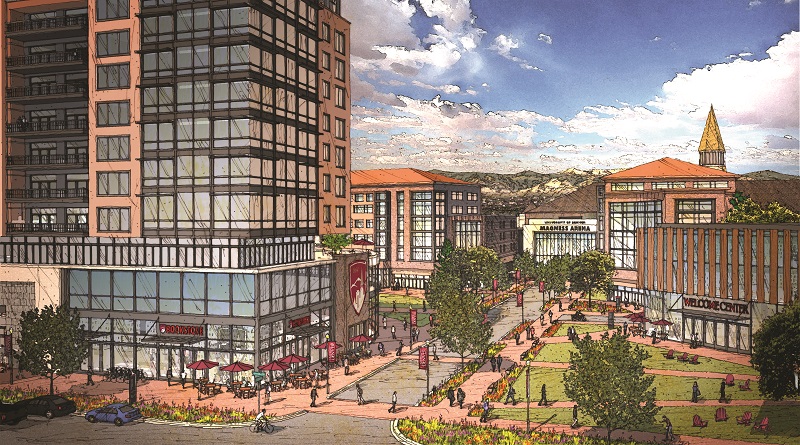University of Denver Unveils Huge Mixed-Use Project
DENVER — The University of Denver (DU) and its Chancellor Rebecca Chopp unveiled on May 30 the Denver Advantage Campus Framework Plan (DACFP), a long-term, malleable strategy that examines ways DU can evolve in the coming years and decades. The plan is the next step in fulfilling the Denver Advantage, a campus blueprint created to optimize the collaborations and relationships that provide students with ongoing success.
The first step is the construction of three new buildings this summer — the Community Commons, First-Year Residence Hall and Pioneer Career Achievement Center and Alumni Center — that aim to transform the student experience upon their opening in fall of 2020. This initial project is reportedly a $143 million undertaking, with the commons the most costly of the elements.
“In the past 20 years, the University of Denver has invested about $1 billion in facilities and infrastructure,” Chopp said. “We are now investing another $143 million in three student-centered buildings. The Denver Advantage Campus Framework Plan will guide us for the next 20 years as we establish a great college town in the heart of the city — with more retail, affordable and market rate housing, dining options and more sustainable transportation solutions. To do that, we’ll need to continue to engage the campus and our neighbors as we go forward.”
With the DACFP, DU envisions its campus’ future as a vibrant college town in the heart of the larger overall city. The goal is a makeover of its 125-acre campus into a more active community, with more retail, affordable housing and restaurant options, and even the potential development of a hotel on the north side of campus. The university hopes to blur its campus boundaries while being more visitor-friendly to the surrounding neighborhoods and also working with the city of Denver on a number of sustainable transportation alternatives.
The new residence hall will be paid for by room and board charges, while the Community Commons and Career Achievement Center will be covered, at least in part, by philanthropy and partnerships. The university also announced that upon the opening of the buildings in 2020, every undergraduate and graduate student will pay a new fee of $6.50 per credit hour in an effort to help fund the Commons.
Last month, the university launched its pilot bike-share program with 200 bikes, promoting sustainable transportation choices. This July, the university will also launch a pilot program with Chariot Shuttles, which will provide a shuttle service to the DU community with stops at the light rail plus other designated route stops, with plans to hopefully grow the service to neighboring communities in the near future.
While all these changes are exciting for DU, there has been concern over increased traffic. With that in mind, the university announced that it received approval on adding new pedestrian crosswalks along Evans Avenue – a street that sees more than 12,000 pedestrians daily on average.
While construction begins on three buildings this summer, other projects described in the plan may take up to 20 years to be fully realized.

